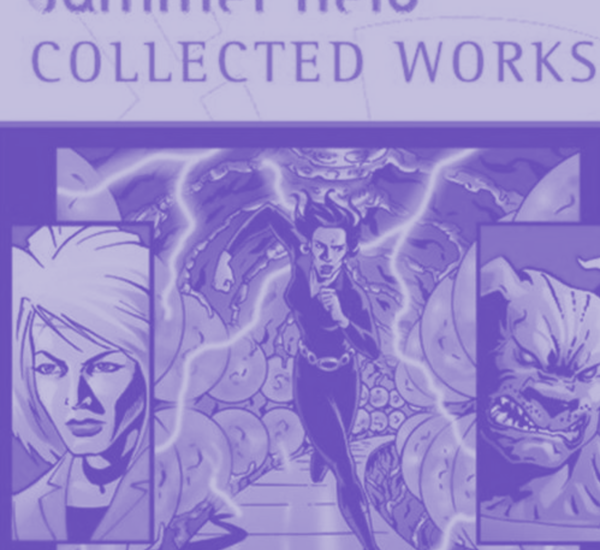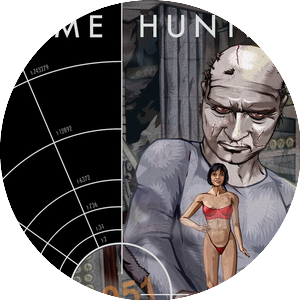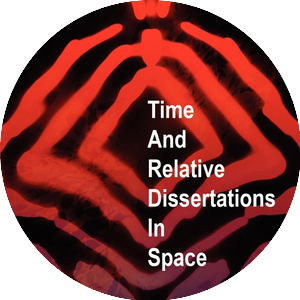Invitation
I knew Nick Wallace before he was somebody. We both used to be part of the online Doctor Who writing group Who-ink – a forum for sharing and commenting on writers’ attempts to pitch for the Virgin and BBC Books Doctor Who ranges back when that was something you were allowed to do. We also bounced around the same circles until we got chatting about Rebus and ended up forming our own mutual support network. We moved in similar circles, but Nick also had connections in places I didn’t: he has worked frequently for Big Finish Productions, and that led them to offer him his first job editing a book – the collection of Bernice Summerfield short stories Collected Works.
When he got the nod, one of the people on his list of potentials was me: partly because we were friends, partly because our previous interactions “pointed to someone who knew how to write and write well”, but also for two other reasons:
One, I was looking (in my own vainglorious fashion) to try to bring some readers of the DW book line over to BF’s Benny line, so I was very keen to put together a Dirty Dozen/Expendables kind of authors line-up. A writing ensemble who would be enough to intrigue those who liked the Who books, but hadn’t been tempted by the BF stuff.
Two, editing the book was big job that was going to take a lot of time and not pay that much, so I also wanted people I knew I could rely on to deliver a finished product which wouldn’t need a lot of work from me.
I knew Nick well enough to know that Collected Works would be something I would want to be a part of.
Inspiration
My usual inspiration for a shared universe story is the characters. Knowing about them and their world suggests the kinds of things that might happen to them, or the kinds of things that would make them react in dramatically interesting ways. That wasn’t an option for Mother’s Ruin, my Collected Works story: I hadn’t followed the Bernice Summerfield spin-offs and only knew the bare facts of her recent history. About her supporting cast, I knew nothing except what was in the original request for pitches.
The only thing I had was a single image: a Cyberman attached to Benny’s home like a canker, slowly growing a new universe of Cybermen using the Collection as raw materials.
Getting the Story
I tried to get around my lack of knowledge of Benny and her cast by developing a story that didn’t feature them: my Cyberman idea turned into a crack team of librarians being dispatched on a routine task to clean the proto-universes that formed like barnacles on the hull of the Collection, only to find that one had been infected by the Cybermen. One of the librarians finds a girl growing in the universe, and adopts her as his own despite having to live his life in a separate and unstable world.
It was an idea that could develop into a good story, but what it wasn’t was a Bernice Summerfield story. More specifically, it wasn’t a Collected Works story, which right from the start Nick intended to have an overall storyline.
There was interesting stuff in the idea, but … the basic set-up of it (in terms of central characters and how the Collection functioned) didn’t really fit with what we had planned. There was also a potential issue over a clash with the Cyberman-oriented Cantus audio that was due out around the same time.
And that should have been that.
Editorial
By this point, the basic shape of the book was coming together and I could see the holes that needed addressing. One of these was the reveal that the Collection had been merged with Brax’s (non-specific for copyright reasons) timeship. That reveal needed to be something which could act as a springboard for the return of Brax in the next season of audios, and the nascent universe idea seemed like a good one to bring those elements out with.
There was a rival pitch that had a “very, very good” idea that could be adapted to fill the editorial hole, but both would need work. It was partly blind luck that Nick chose me – the other pitch relied heavily on Collected Works’ newly created supporting cast The Quire, and he was worried about how much editorial time might be swallowed up in making their portrayal consistent. But mostly it was my prior experience, both of writing and of Nick. He knew that he could suggest a new story that took my idea of a barnacle universe but did what he needed to complete the Collected Works story-arc, and I would be able to love it like my own. And he would get another name on the roster for the book that might bring the Doctor Who audience to Big Finish.
So Nick asked if I’d be willing to start from scratch on the story: keep the idea of the new universes being born from the Collection, but instead make it an unexpected result of Brax having merged his timeship with the space station. I came up with a second synopsis, which went to Nick and his de-facto co-editor Philip Purser-Hallard, who was handling the development and characterisation of the Quire. They made a few suggestions as to points that would tie into the continuity of the book and the Bernice Summerfield audio series that Collected Works fell within, and told me to go away and write it.
What Happened Next?
With the benefit of hindsight, Nick has worried about how well he fulfilled his initial ambition for Collected Works – to create a Bernice Summerfield collection that drew Doctor Who fans into the range by showcasing the authors that they loved. Nick worried that he hadn’t given the authors the freedom they needed to tell the kind of stories that would excite their audience by making them write to a fixed over-arching plot:
The anthology was trying to do too many things (tie up existing storylines, set up new ones, tell a cohesive story in itself). It’s a good book and yours is a good story, but - in retrospect - I wish I’d not tried to do so much within it and just been able to let the authors off the leash a bit more. I think the best stories in CW were the ones where people had a chance to do that.
Mother’s Ruin isn’t a story that any of the other people who have offered me work have cited as an influence on their decision, and it isn’t one that would be the first mentioned in any discussion of why you might like my writing. That is nothing to do with its relative obscurity – the story that has gained me the most work was published in a fanzine seen by about 50 people – but Nick is ready to take the blame:
Being totally honest, I don’t think it’s the strongest story in the anthology or the best bit of writing you’ve ever done, but that’s largely down to the brief you were writing to. There was lot of heavy lifting for your story to do in a comparatively tight word count, and it’s genuinely tough to deliver to a brief like that.
However, I think there’s a simpler explanation. With Collected Works, I moved into a shared universe I had no knowledge of. The only connections I could make to that universe were second-hand, based on the suggestions of other writers. Whilst you can write a good story, an entertaining story, without really knowing any of your central characters … you can’t write a great one. That is true whether you have your characters handed to you, or make them up yourself.
But at the end of the day, Mother’s Ruin is a story I am still proud of, and Nick Wallace is someone that I would jump to work again with, either as an editor or a writer. And, more importantly, he is someone who would still work with me.


